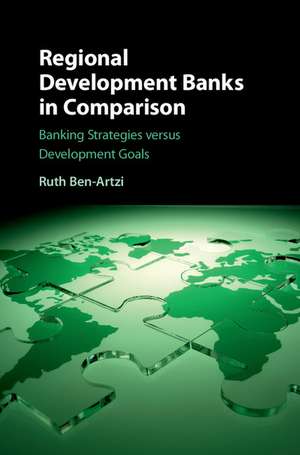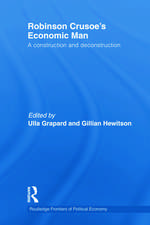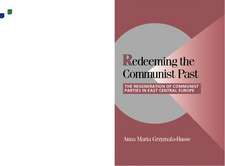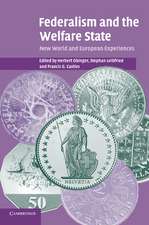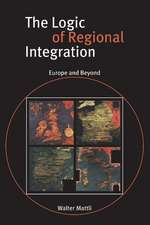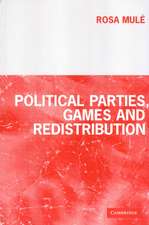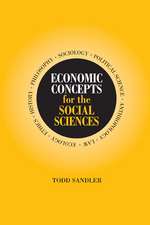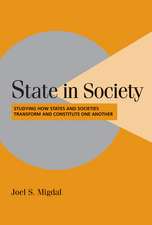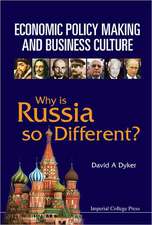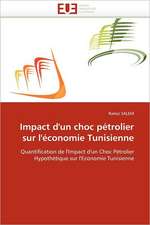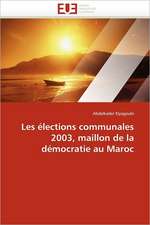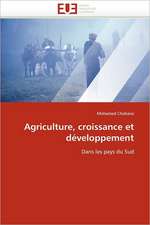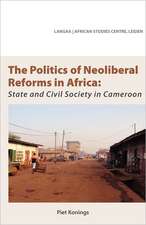Regional Development Banks in Comparison: Banking Strategies versus Development Goals
Autor Ruth Ben-Artzien Limba Engleză Hardback – 7 sep 2016
| Toate formatele și edițiile | Preț | Express |
|---|---|---|
| Paperback (1) | 287.07 lei 6-8 săpt. | |
| Cambridge University Press – 25 apr 2018 | 287.07 lei 6-8 săpt. | |
| Hardback (1) | 695.93 lei 6-8 săpt. | |
| Cambridge University Press – 7 sep 2016 | 695.93 lei 6-8 săpt. |
Preț: 695.93 lei
Preț vechi: 781.95 lei
-11% Nou
Puncte Express: 1044
Preț estimativ în valută:
133.21€ • 144.74$ • 111.97£
133.21€ • 144.74$ • 111.97£
Carte tipărită la comandă
Livrare economică 21 aprilie-05 mai
Preluare comenzi: 021 569.72.76
Specificații
ISBN-13: 9781107163430
ISBN-10: 1107163439
Pagini: 294
Ilustrații: 41 b/w illus. 18 tables
Dimensiuni: 158 x 235 x 24 mm
Greutate: 0.57 kg
Editura: Cambridge University Press
Colecția Cambridge University Press
Locul publicării:New York, United States
ISBN-10: 1107163439
Pagini: 294
Ilustrații: 41 b/w illus. 18 tables
Dimensiuni: 158 x 235 x 24 mm
Greutate: 0.57 kg
Editura: Cambridge University Press
Colecția Cambridge University Press
Locul publicării:New York, United States
Cuprins
Introduction; 1. International financial institutions, development, and regional development banks; 2. Multilateral governance: theoretical and empirical underpinnings; 3. Origins, politics, and structure of regional development banks; 4. RDB loans and developing countries; 5. Banks or development agencies?; 6. Political and economic constraints, principals and agents, and prospects for development; Conclusion.
Recenzii
'Regional Development Banks in Comparison is one of the most important studies of regional development banks to date. Based on an impressive array of empirical evidence, Ruth Ben-Artzi demonstrates that, because these institutions tend to emphasize their banking goals, they have failed to meet their mandate of providing poorer countries with development assistance. The result is a book that makes a valuable contribution to our understanding of economic development, international institutions, and globalization.' Edward D. Mansfield, Hum Rosen Professor of Political Science, University of Pennsylvania
'Regional Development Banks in Comparison is a wonderful example of mixed-methods social science research. Ruth Ben-Artzi does a masterful job describing the split personalities of the world's most important regional development banks (RDBs) and asks whether their policy behavior reflects their identities as banks or as development institutions. The answer varies over time and across institutions, and the behavior of RDBs can be explained by synthesizing different theories of international organization. This book is a must-read for anyone who is interested in the history of RDBs, but also for anyone trying to figure out how to reform existing institutions or explain the behavior of new institutions like the Asian Infrastructure Investment Bank.' Michael J. Tierney, Hylton Professor of Government and International Relations, College of William and Mary, Virginia
'Regional Development Banks in Comparison is a wonderful example of mixed-methods social science research. Ruth Ben-Artzi does a masterful job describing the split personalities of the world's most important regional development banks (RDBs) and asks whether their policy behavior reflects their identities as banks or as development institutions. The answer varies over time and across institutions, and the behavior of RDBs can be explained by synthesizing different theories of international organization. This book is a must-read for anyone who is interested in the history of RDBs, but also for anyone trying to figure out how to reform existing institutions or explain the behavior of new institutions like the Asian Infrastructure Investment Bank.' Michael J. Tierney, Hylton Professor of Government and International Relations, College of William and Mary, Virginia
Notă biografică
Descriere
A comparative study contributing to international relations and international political economy theory, raising substantive issues relating to aid, development, international relations and globalization.
